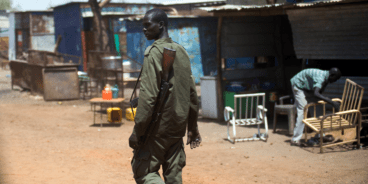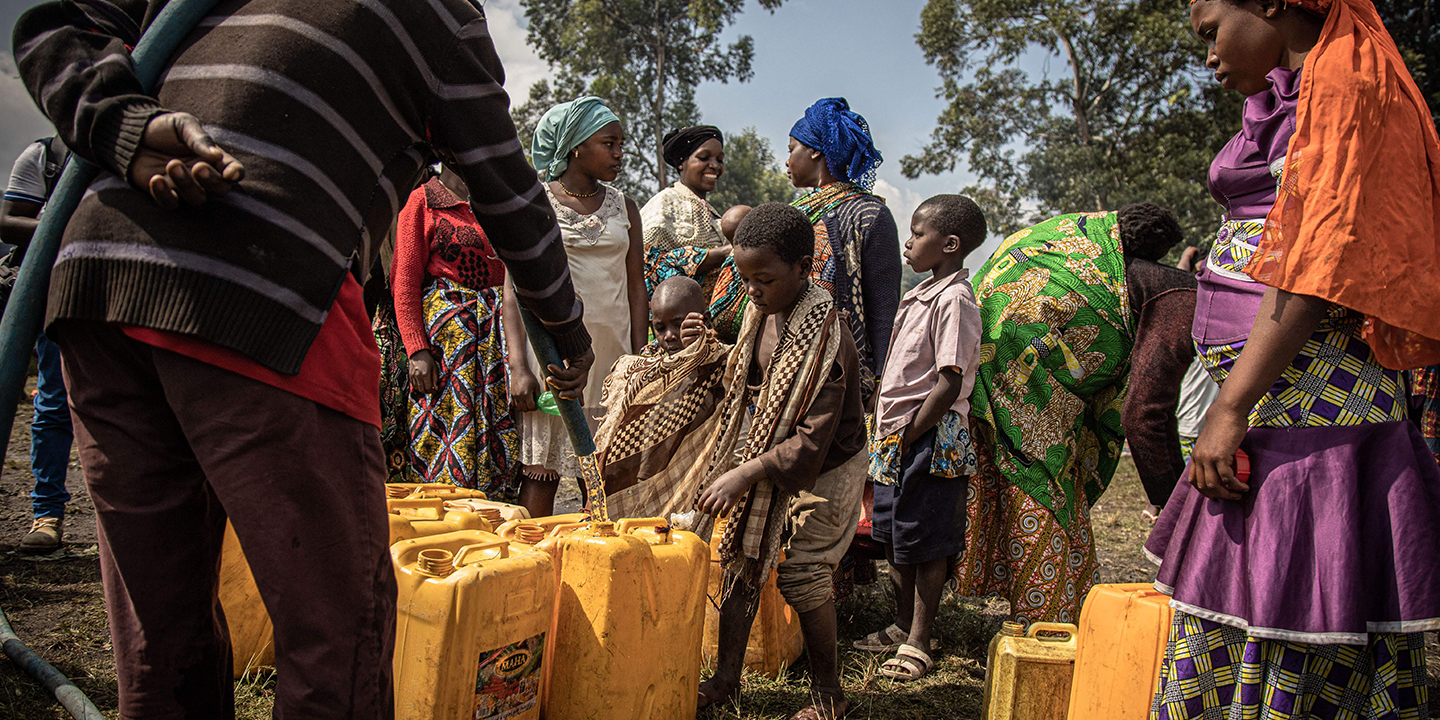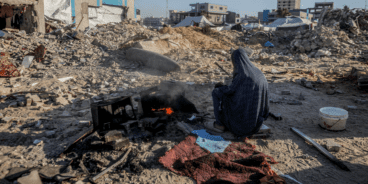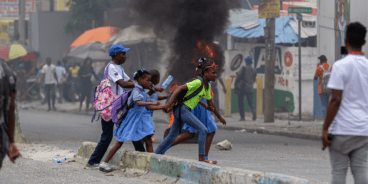

Atrocity Alert No. 303: Democratic Republic of the Congo, Myanmar (Burma) and Mali
Atrocity Alert is a weekly publication by the Global Centre for the Responsibility to Protect highlighting situations where populations are at risk of, or are enduring, mass atrocity crimes.
CIVILIANS AT RISK AMID RENEWED CLASHES WITH M23 ARMED GROUP IN EASTERN DR CONGO
On 22 May heavy fighting erupted between Congolese security forces and rebels from the March 23 Movement (M23) in the Democratic Republic of the Congo’s (DRC) eastern North Kivu province. In just one week the violence internally displaced at least 75,000 people and forced 11,000 to flee to neighboring Uganda.
The renewed clashes mark the biggest offensive by M23 in a decade. Huang Xia, UN Special Envoy of the Secretary-General for the Great Lakes region, said, “history seems to be sadly repeating itself,” and emphasized that urgent action is needed to avoid a new escalation with “immeasurable humanitarian, security and political consequences.”
Initially, M23 consisted of soldiers who participated in a mutiny from the government armed forces (FARDC) in eastern DRC in April and May 2012. M23 fighters – allegedly supported by Rwanda and Uganda – launched an offensive, taking over large parts of North Kivu province. After the group briefly captured the provincial capital, Goma, government troops – supported by the UN peacekeeping operation in the DRC (MONUSCO) and its Force Intervention Brigade – defeated the group in 2013. Previous clashes between the FARDC and M23 resulted in widespread abuses and violations against populations. Some M23 members also have a history of perpetrating atrocities in Ituri and North Kivu provinces prior to joining the group. M23 fighters summarily executed and raped dozens of civilians and forcibly recruited hundreds of men and boys, becoming “among the worst perpetrators of human rights abuses in [DRC], or in the world,” according to the then-UN High Commissioner for Human Rights, Navi Pillay.
After years of dormancy following their 2013 defeat, the group resurfaced in November 2021, accusing President Félix Tshisekedi of not abiding by existing peace agreements, including amnesties for the group’s rank-and-file. Since then, M23 fighters have launched a series of attacks targeting military positions, as well as against civilians in communities near Rutshuru and Nyiragongo territories. The UN has accused M23 rebels of “deliberately” targeting and attacking MONUSCO. Since the resumption of hostilities, the DRC government has alleged that the Rwanda Defence Force was actively fighting alongside the M23. On 31 May, after accusing the FARDC of firing a cross-border rocket strike, the Rwandan government warned that it would retaliate against any further attacks.
The governments of Rwanda and DRC should engage in dialogue to prevent any further escalation. The DRC government must develop a comprehensive plan for negotiations with the M23. All parties to the conflict should minimize civilian harm during clashes and uphold their obligations under International Humanitarian Law. The DRC government must hold all perpetrators of atrocities accountable for their crimes. A credible disarmament, demobilization, reintegration and repatriation program should be implemented to encourage groups like M23 to permanently lay down their arms.
MYANMAR’S MILITARY PLANS JUDICIAL EXECUTIONS OF DEMOCRACY ACTIVISTS
On Friday, 3 June, Myanmar’s (Burma) military – the Tatmadaw – announced it will carry out the first judicial executions in the country since 1990. The military government is planning to execute two men – veteran democracy activist, Ko Jimmy, and former National League of Democracy lawmaker, Phyo Zayar Thaw – on charges related to alleged terrorism. The military rejected their legal appeals, confirming the death sentences will take place at an unknown date. Since the 1 February 2021 coup, 114 people have been sentenced to death in Myanmar, according to the Assistance Association for Political Prisoners.
UN member states, including Canada, France and the United States, have condemned the planned executions. Stéphane Dujarric, Spokesperson for the UN Secretary-General, said that Secretary-General António Guterres “reiterates his calls for the respect of people’s rights to freedom of opinion and expression and also to drop all charges against those arrested on charges related to the exercise of their fundamental freedoms and rights, and for the immediate release of all political prisoners in Myanmar.”
The confirmation of these executions comes amidst growing evidence of mass atrocities perpetrated by the military throughout the country. On 31 May Amnesty International released a report that provided evidence of war crimes and probable crimes against humanity in eastern Kayah and Kayin states since the coup. The documented tactics used by the military include widespread aerial and ground attacks, the systematic looting and burning of villages, and arbitrary detentions that often lead to torture or extrajudicial executions. According to Amnesty International, the Tatmadaw has perpetrated a campaign of collective punishment against Karen and Karenni civilians in eastern Myanmar.
Liam Scott, Research Associate at the Global Centre for the Responsibility to Protect, said, “the growing evidence of atrocities in Myanmar, including war crimes and crimes against humanity, should push the international community – especially the UN Security Council – to finally take concrete action regarding the ongoing crisis. Prolonged inaction by the Security Council, despite the conclusive evidence of atrocities, is the epitome of failing to uphold their responsibility to protect.”
CIVILIAN KILLINGS SOAR AS VIOLENCE INTENSIFIES ACROSS MALI
Six civilians and two peacekeepers from the UN peacekeeping mission in Mali (MINUSMA) were killed in separate incidents on 2 and 3 June by improvised explosive devices in central Mali. This is the sixth attack against a UN convoy since 22 May. The peacekeepers were killed while escorting a dozen UN vehicles that were accompanying a convoy of civilian trucks carrying fuel. In Kidal, northern Mali, another UN peacekeeper died when a convoy was attacked with small arms and rocket launchers on Wednesday, 1 June. Attacks on peacekeepers can constitute war crimes and undermine the ability of the UN to protect populations at risk. Since July 2013 the UN has documented 160 peacekeepers killed in hostile acts, making MINUSMA the deadliest UN peacekeeping mission.
Since the start of 2022 violence in the center and north of Mali has intensified, resulting in increased civilian casualties, kidnappings, mass displacement and hostility towards MINUSMA. Armed Islamist groups allied to al-Qaeda and the so-called Islamic State are primarily responsible for the escalation in violence as they compete for control of localities. Between 1 January-31 March MINUSMA documented 812 abuses and violations of human rights and International Humanitarian Law (IHL). Armed Islamist groups were responsible for half of the documented violations. The number of civilians killed increased “exponentially” by nearly 324 percent, with 543 killed compared to 128 the previous quarter.
MINUSMA also documented a significant increase in human rights violations committed by the Malian defense and security forces (MDSF), with 320 violations as compared with only 31 in the previous quarter. In an attempt to curtail the spread of armed Islamist groups, the Malian Armed Forces, occasionally supported by “foreign military elements,” have carried out increased military operations in recent months. Many of these operations have resulted in serious violations of human rights and/or IHL. Notably, the MDSF allegedly summarily executed, raped, pillaged and arbitrarily detained civilians during their operation in Moura, central Mali. According to witnesses, the MDSF and foreign mercenaries killed captives at close range – often without interrogations – based on their ethnicity or clothes and buried them in mass graves. The exact number of people killed in Moura is not yet determined; however, Malian authorities reported at least 203 whereas some estimates suggest the number could be as high as 500.
At the end of June, the mandate for MINUSMA is up for renewal. The UN Security Council must renew its mandate, maintaining its strong civilian protection and human rights reporting mandate and requesting the mission strengthen its early warning and response mechanisms. It is imperative that Malian transitional authorities cooperate with MINUSMA and ensure that the mission can effectively carry out its mandate, particularly its human rights investigations.
Related Content


Atrocity Alert No. 438: Israel and the Occupied Palestinian Territory, Mali and Myanmar (Burma)
